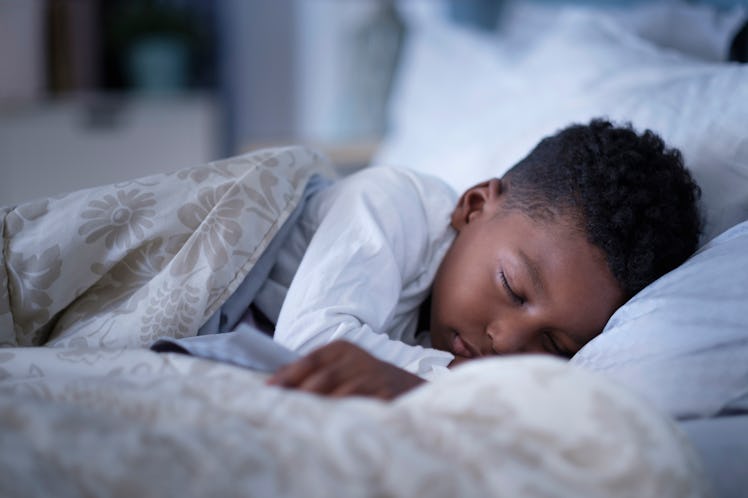The Scientific Case For Obnoxiously Early Bedtimes
From improved school performance to reduced obesity risk, putting kids to bed early is what's best for them.

Getting your kid ready for bed as early as 7 p.m. could lower their future obesity risk and make them less vulnerable to future illness while priming them for better growth, academic achievement, and emotional wellbeing. A growing body of research indicates that children who get to bed late are not, as they might suspect, lucky or sophisticated, but set up to fail.
“Children’s natural rhythm is to need to go to sleep well before adults do, and if children are kept up as late as their parents, they’re being deprived the opportunity to grow and learn as well as possible,” says Andrew J. Bernstein, M.D., a professor of of clinical pediatrics at Northwestern University Feinberg School of Medicine.
The American Academy of Pediatrics (AAP) recommends infants under a year sleep 12 to 16 hours, kids 1- to 2-years-old sleep 11 to 14 hours, and 3- to 5-year-olds sleep 10 to 13 hours — all per 24-hour period, including naps. Evidence demonstrates that less sleep impairs children’s ability to learn, retain information, and regulate their emotions. It also predisposes them towards a variety of health problems, most notably obesity.
Although technically the amount of hours matter more than at what time when they go down, multiple studies demonstrate that bedtimes have much more of an effect on how much sleep kids get than wake times.
In one study, published in The Journal of Pediatrics, researchers followed nearly 1,000 preschoolers into adolescence, tracking their bedtimes around age 4, in addition to their height, weight, and body mass index (BMI) when they were about 15-years-old. Results showed that 39% of children who went to bed after 8 p.m. when they were 4 were obese as teenagers, compared to only 10% of their peers who went to bed before then.
Strengthening the case that reduced risk is specific to earlier bedtimes, an additional study from 2015 found that higher BMIs among adolescents could not be explained by sleep duration alone. Additional studies indicate that daytime sleep did not have the same benefit when it came to curbing future obesity odds, so naps aren’t going to cut it.
“Napping during the day to make up for poor nighttime sleep is just catch-up sleep and is the sign of an exhausted child,” Bernstein warns. “That child still suffers from the lack of good consecutive sleep at night.”
As kids get older, sleep is still very important, but for different reasons. The benefits beyond early childhood skew more towards improved school performance and emotional stability, Bernstein notes. But by this time, if their sleep hygiene is horrible, it’s going to be that much harder to encourage healthy habits.
Not every sleep-training method works for every family, but there are plenty of small things parents can do to foster earlier sleep schedules. Bernstein recommends utilizing security objects such as a stuffed animal, slowly weaning the child from needing the parent at their bedside, and gradually lengthening the time parents leave kids alone in their cribs so they can develop the independence needed to fall asleep on their own. Ultimately, it’s about routine. And since bedtime routines take at least a half hour, this means starting no later than 7:30 p.m., but probably earlier to be safe.
In a weird way, parents are kind of weaning themselves too, by adjusting to a different degree of responsiveness over time. Sure, there might be tears at first, but there will be a hell of a lot less to cry about throughout life if you get them to bed early.
It worked for Bernstein. “My children who are now 10 and 15 still benefit from solid, consecutive sleep at night because I started the pattern with them when they were young infants,” he says.
This article was originally published on